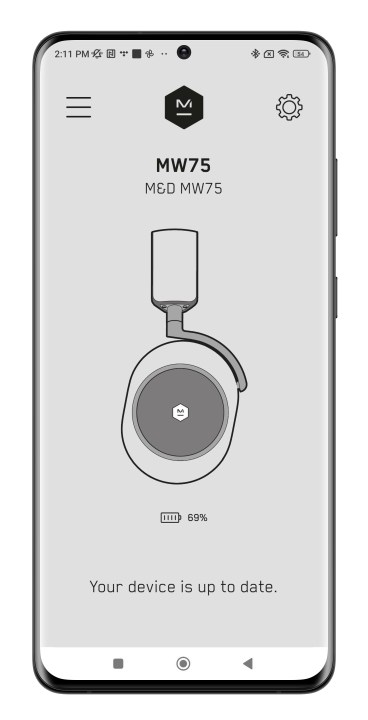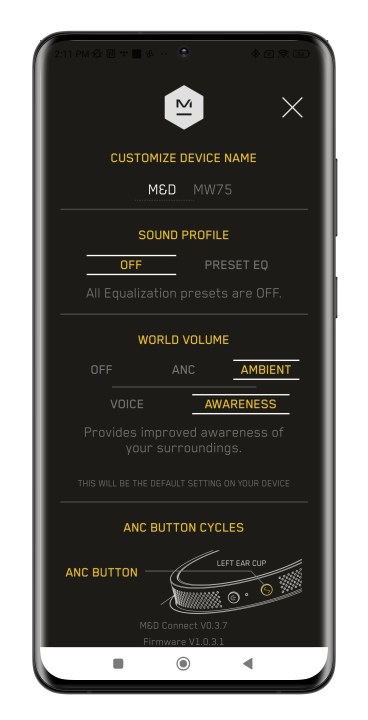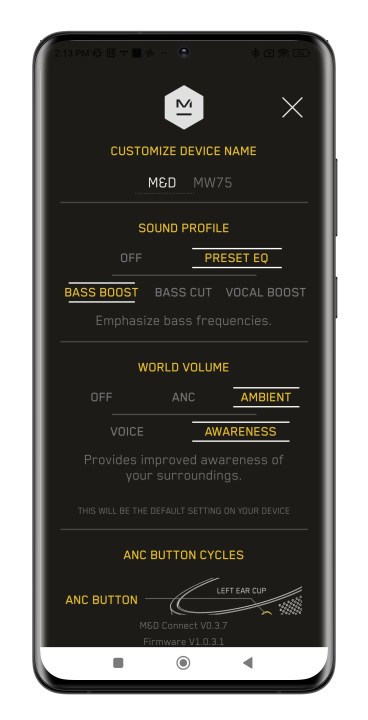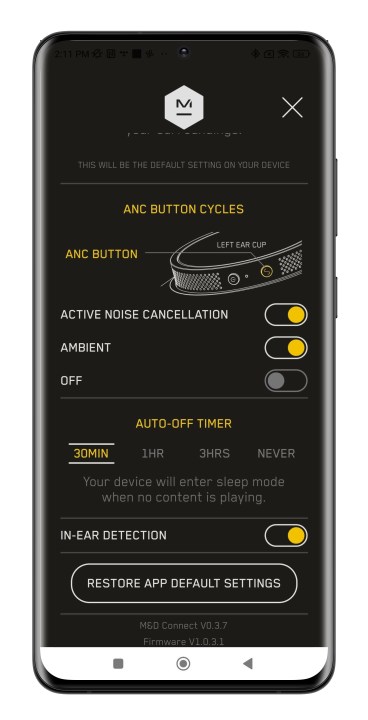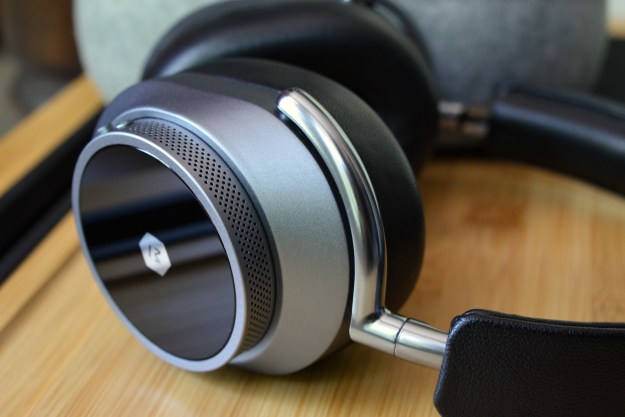
“Ultra-premium sound and style for an ultra-premium price.”
- Luxurious materials
- Top-notch build quality
- Incredible sound
- Very good battery life
- Digital wired connection
- Wear sensor
- Very expensive
- Huge carrying case
- Heavy
- Annoying ANC mode switching
Master & Dynamic (M&D) is a company that’s just as obsessed with how its products look as it is with how they perform. You might even say that style is the element that most sets it apart from the likes of Bose, Sony, Sennheiser, and Apple. You can see the roles style and design have played in its previous wireless headphones and wireless earbuds, like the MW65 or the MW08/MW08 Sport. Those products were crafted with exotic materials like glass, leather, high-polish ceramics, stainless steel, aluminum, and carbon fiber — indeed, exactly the kinds of materials you’d expect to find in a luxury car, and with correspondingly high prices.
And nowhere is this approach more evident than in M&D’s latest audio creation, the $599 MW75, a set of wireless, noise-canceling headphones that push style, audio quality, and price to all new heights. They’re definitely not for everyone, but if you have the cash, they’re a tempting toy.
Master & Dynamic is currently taking email sign-ups on the MW75 landing page if you want to be notified when these headphones go on sale, but the company tells Digital Trends that it expects that will happen on June 28, 2022.
A case in point

M&D’s previous flagship cans, the $499 MW65, did not ship with a travel case — just a protective pouch. That seemed like an odd choice for such an expensive set of headphones, and clearly, M&D has decided to rectify that with the MW75 by going as far in the opposite direction as you can go. They come packaged in a zippered, formed-felt hard case with thick sidewalls. Only Bose offers a similar level of protection.
Inside, you’ll find the many included accessories thoughtfully arranged in a semi-rigid plastic housing: A USB-C cable for charging and digital audio, a 3.5mm jack-to-USB-C for analog audio, a USB-A-to-USB-C adapter, an airplane adapter, and a 3.5mm-to-quarter-inch adapter.
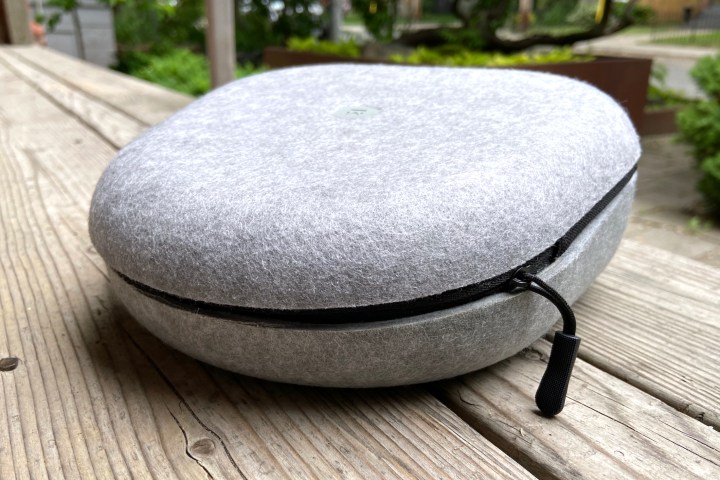
However, the cost of such a well-appointed and protective case is size. Though its width, length, and rounded-triangle shape are all a tad smaller than the case Sony includes with its WH-1000XM5 headphones, the M&D case is much thicker: Almost 4 inches at its widest point, versus 2.5 inches for Sony’s. For frequent travelers, that’s going to mean some serious rationalization around which other items will grace the interior of their Louis Vitton carry-on.
Still, M&D deserves props for the fact that it uses completely recyclable materials for its product boxes and that you won’t find a single polybag or even so much as a disposable twist-tie.
Maximum design

While Sony, Bose, Apple, and (seemingly) Sennheiser are all taking their flagship headphones in a more form-fitting and — in some cases — much lighter-weight direction, M&D is marching proudly in the other direction. The MW75 have big, thick earcups that protrude a fair amount from the sides of your head. The outer surface is a sheet of tempered glass, encircled by a perforated aluminum ring, and printed with M&D’s hexagonal logo. It’s a fingerprint magnet, but it sure looks sharp when clean.
Construction is top-notch, with near-perfect seams. Gone is the MW65’s earcup fork and external slider rod design, replaced instead with a stunning polished aluminum single-sided pivot that extends into fully integrated sliders that disappear into the leather headband. It reminds me a great deal of the now-defunct Parrot Zik, a set of headphones that were ahead of their time. In keeping with the trend of the day — and not one I necessarily support — the MW75 fold flat but don’t fold up, which is part of the reason that they need such a large case. Thankfully, when flat, the ear cushions face down so that your collarbones are protected from the hard outer surfaces of the earcups when you wear them around your neck.
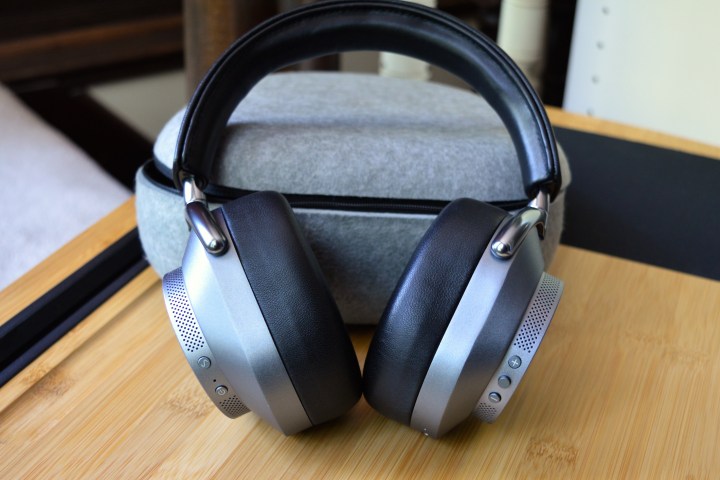
Small aluminum control buttons grace the rear of each earcup (two on the left, three on the right), giving you access to all available functions like power, pairing, active noise cancellation (ANC), volume, and playback. Like the Apple AirPods Max, the plush, leather-wrapped ear cushions are magnetically latched to the earcups, making them a cinch to replace should the need arise.
But all of these features and materials come at the cost of increased weight. The MW75 tilt the scales at a hefty 11.9 ounces, making them one of the heavier sets of wireless cans you can buy, though still well shy of the AirPods Max’s neck-crushing 13.6 ounces.
Overall, the MW75 are big but beautiful. And if you don’t care for our review model’s Gunmetal/Black Leather attire, you can also choose from Silver Metal/Gray Leather, Silver Metal/Brown Leather, and Black Metal/Black Leather combos.
Comfort, controls, and connections

There are no two ways about it: The MW75 are heavy. M&D has done a very good job of balancing and distributing that weight, but it remains noticeable, especially when you move your head about. Those luxurious ear cushions offer a glove-like fit, but they also push the mass of the earcups away from your head. That creates inertia: Turn your head, and it takes a moment for the headphones to catch up. For that reason, I don’t recommend them for any kind of physical activity like running or the gym. Walking is fine, and there should be no problem with using them while commuting, other than a few envious stares.
Despite the bulk, I still found them comfortable, even after two hours of continuous use, but if you need wireless headphones for long flights, the Sony WH-1000XM5 or Bose Noise Cancelling Headphones 700 are both better options.

The controls are excellent: Easy to find, easy to press, and they offer great tactile feedback. M&D combines power and pairing into a single button and gives you a dedicated button for ANC. This can be customized in the companion app so you can choose to cycle between ANC, ambient, and off modes, or any combination thereof. On the right earcup, a raised multifunction button eliminates any doubt as to which button you need to press.
New to the MW75 is wear detection. With this option enabled, the headphones will auto-pause your music when you remove them and resume when you put them back on. But mysteriously, the auto-resume function has a tiny window of just three seconds. If you leave the headphones off your head for any longer than that, you’ll have to restart your music manually via the controls or your phone. At the moment, there’s no way to adjust that three-second period, but M&D might include this in a future firmware update.
It is, quite simply, the best overall sound quality I’ve heard from a set of wireless headphones.
Wireless headphones usually come with an analog cable option — sometimes it works when the batteries are dead and sometimes it doesn’t. But the MW75 are magnificently equipped to handle a variety of wired scenarios: The USB-C-to-USB-C cable gives you a digital wired interface, which means you can use the headphones’ internal digital-to-analog converter (DAC) for an absolutely pristine connection, without the need for a headphone DAC/amp (many of which can cost upward of $200). This cable needs the headphones to be used in their powered-on state. But the 3.5mm-to-USB-C cable doesn’t. It can be used to listen to analog sources with or without battery power.

The wireless connection is solid and stable, but M&D doesn’t include technologies like Google Fast Pair or Microsoft Swift Pair, so you’ll still need to find the MW75 in your device’s Bluetooth settings. Given that most folks will only pair their headphones a handful of times, this is hardly a deal breaker. More importantly, these cans support Bluetooth Multipoint, so you can keep them connected to any two devices (like a PC and a phone) simultaneously.
If you’re an ardent Google Assistant (GA) user, you may be a bit disappointed to learn that the MW75 do not have GA built-in, something the MW65 offered. You can still trigger your phone’s native voice assistant using the control buttons, but you can’t summon it with your voice.
Sound quality
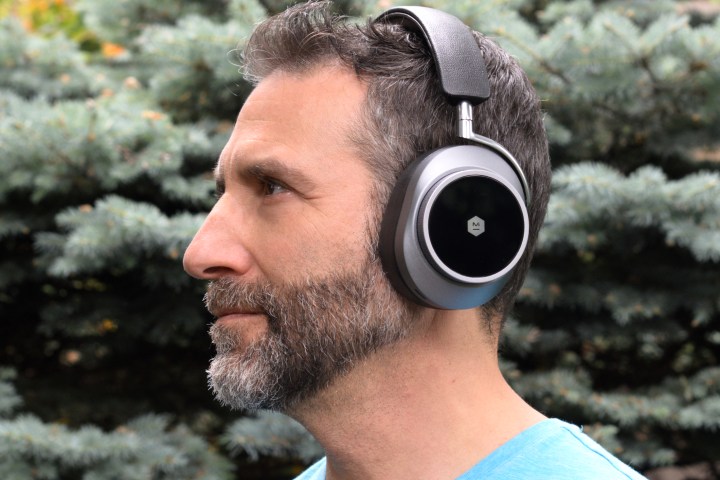
Master & Dynamic headphones and earbuds have always been superb performers, and the MW75 are no exception. They possess an impressively balanced and rich signature that complements virtually any music genre you care to throw at them. Resonant bass is accompanied by detailed midtones and absolutely crystalline high frequencies. It is, quite simply, the best overall sound quality I’ve heard from a set of wireless headphones to date, beating even Sony’s WH-1000XM5.
At this stratospheric level of product, comparisons can get tricky: You need to switch back and forth between the XM5 and the MW75 multiple times, across a variety of tracks, to get a sense of where the two diverge, but diverge they do. The MW75 have a precision that is remarkable. This comes across in both the quality of the sound — from the pluck of a guitar string to a hit of a cymbal — and also in the resolution of the soundstage.
What does that mean, exactly? With the XM5, you get a strong sense of the placement of various instruments and vocals, but with the MW75, it feels like you can take a measuring tape and say, to within an inch or so, just how far apart the musicians are standing.

M&D is so confident in its tuning that it only offers a few scant EQ adjustments in the app: Bass boost, bass cut, and vocal boost. Bass boost, despite its name, is only a mild enhancement of lower frequencies, while bass cut and vocal boost both provide pretty dramatic changes to the sound signature. Neither enhanced my enjoyment of music, but I could see vocal boost being helpful for some spoken-word content or possibly when using the MW75 for calls.
These headphones also benefit from Qualcomm’s aptX Adaptive tech. When connected to compatible Android phones, they can automatically connect at a higher data rate for up to 24-bit/48kHz (lossy) hi-res sound quality. It can make a difference, but only under very specific circumstances. You’ll need access to lossless hi-res audio, like Amazon Music or Apple Music’s collection of lossless tracks (or your own lossless ALAC/FLAC tracks), a very quiet place to listen, and to be in close proximity to your phone (across the room probably won’t work).
Call quality can be excellent in quiet conditions — your voice will come through with total clarity.
But the great news is that if you want the very best possible sound quality, it’s within reach by simply using the included USB-C-to-USB-C cable. You’ll get a true lossless 24/96 signal that never degrades, and it works on any PC, Mac, or Android device with a USB-C port. Sadly, this means that iPhone users are once again left out. They don’t get aptX Adaptive, and the USB-C cable won’t work, even with a USB-C-to-Lightning adapter (yup, I tried it).
The analog connection is almost as good, though in this situation, your results will be in part determined by your source device’s DAC and amp — especially if you use the MW75 in their powered-down state. But I recommend avoiding this if you can: M&D’s amplification and signal processing (both of which are bypassed when the cans are turned off) add so much to the experience that anything less just pales by comparison.
Noise cancellation and call quality

With four mics dedicated to ANC and a further four mics for voice pickup, the MW75 is loaded for bear. Unfortunately, it takes more than a bushel of mics to make these features perform, and Master & Dynamic still has some work to do.
Not that ANC is bad by any means — it’s actually very good at dealing with a variety of annoying background sounds like traffic, droning machinery, and even the chattering din of voices in a Starbucks. It’s even remarkably adept at dealing with wind noise.
But the execution isn’t as good. When using them just for a bit of quiet (no audio), there’s a noticeable background hiss, regardless of the three available ANC modes (max, all day, or adaptive) you’ve engaged. There’s also a voice announcement of mode changes between off, ANC on, and ambient (transparency) that can’t be turned off. But the most annoying aspect is the almost two-second interruption of your music that follows these announcements every time you switch.
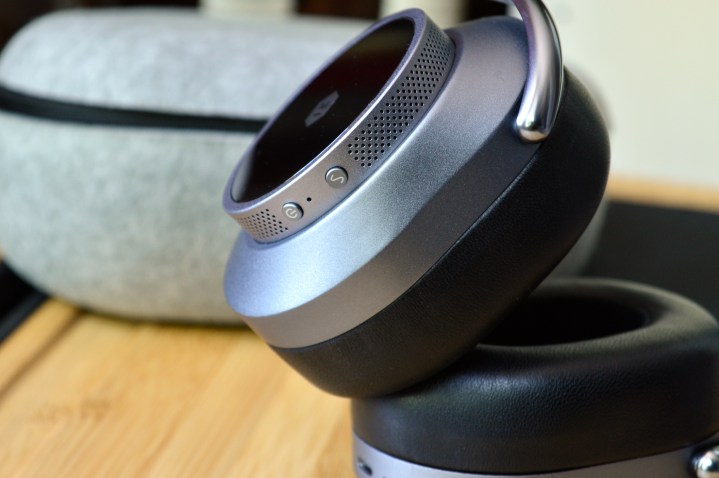
Ambient listening works well — whether in voice (better for conversations) or awareness (general activities) mode — though you won’t get Apple’s as-yet unvanquished level of complete transparency.
Call quality can be excellent in quiet conditions — your voice will come through with total clarity. Under noisy conditions, this takes a bit of a hit. Your callers won’t be able to hear those loud background sounds, but they will hear the effect the MW75’s noise-canceling circuits have on your voice as it wavers in and out and undergoes what is, at times, heavy compression.
My review unit wasn’t able to perform calls while in ambient mode, a limitation M&D says it is working to fix with an upcoming firmware update.
Still, as a companion for Zoom or Teams calls while indoors, they’re more than effective.
Battery life
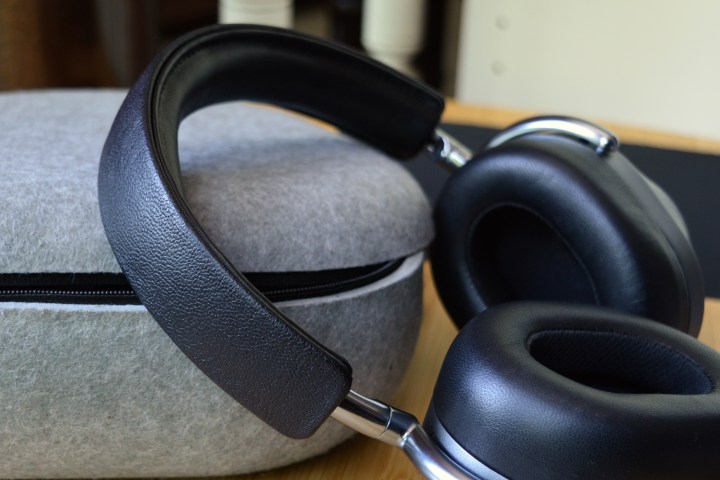
M&D claims 32 hours of play time when ANC is off and 28 when it’s on (assuming you’re listening at a 50% volume level). Those are very decent numbers, and from what I can tell, they’re accurate. The MW75 will beat the AirPods Max and the Bose Noise Cancelling Headphones 700 (both of which only get 20 hours of ANC time). But even if you start to run low, an excellent quick-charge feature will buy you an extra six hours of use for just 15 minutes of charging time.
Our take
Few folks will be able to manage the Master & Dynamic MW75’s wallet-crushing $599 price, but those who do will be rewarded with unsurpassed sound quality in both wired and wireless modes, and a sumptuous and comfortable design (despite being on the heavy side).
If you care about a lossless digital connection to your music, you may well be able to justify the extra cost, because in most cases, the MW75 can operate without a separate headphone DAC/amp — a $100 to $250 savings. They’re not perfect in every way, but that simply might not matter.
Is there a better alternative?
For sound quality, no. The MW75 might not be the kings of the audio hill forever, but right now, they’re unbeatable, at least when it comes to wireless headphones. They also make a strong argument for those who seek a higher standard in design and materials — only the AirPods Max offer serious competition in this department, but I’d argue the MW75 look more sophisticated even if they can’t boast Apple’s impressively low-profile shape.
But for comfort, noise cancellation, call quality, customization, and features, the Sony WH-1000XM5 are still the best, and frankly, they’re not that far behind the MW75 on sound.
How long will they last?
Treat these headphones well and they will likely last for many years of use. The materials and build quality are superb, the carry case offers excellent protection, and the ear cushions are quickly and easily replaced if needed. Only battery life will limit their full lifespan, but this is true of all wireless headphones. Master & Dynamic backs the MW75 with a standard one-year warranty, which does not cover normal wear and tear.
Should you buy them?
If you have the means and are willing to trade some of their limitations for what they do well, then yes — you will be rewarded with a fine set of headphones with few equals.
Editors' Recommendations
- Bluetooth on Sonos’ new Era speakers isn’t what you think – it’s better
- What is Sonos? The speakers, app, and everything you need to know about wireless music
- The first Roku-made televisions are now available at Best Buy
- Sonos’ new Era 100 and Era 300 wireless speakers go all-in on spatial audio and Bluetooth
- LG’s new XBoom XL7 and XL5 speakers offer a portable sound and light show

